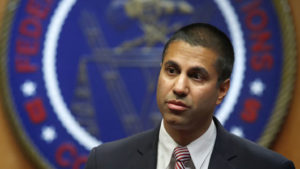by WorldTribune Staff, April 24, 2018
The repeal of Obama-era net neutrality became official on April 23.
Federal Communications Commission (FCC) Chairman Ajit Pai said the Restoring Internet Freedom Order ends the Obama administration’s “heavy-handed” rules and will mean less regulation and a more free and open Internet.

“Americans will still be able to access the websites they want to visit,” Pai said when net neutrality was repealed in December. “They will still be able to enjoy the services they want to enjoy. There will still be cops on the beat guarding a free and open Internet. This is the way things were prior to 2015, and this is the way they will be once again.”
Writing for National Review on April 23, Mairead McArdle noted that Obama-era net neutrality had “imposed heavy regulations on Internet-service providers, classifying them as public utilities. Critics said that the rules choked companies like popular streaming services by regulating how they present content to consumers. Those pushing for the rules argued that control of the Internet should not be left to the whims of private companies.”
Some media outlets did not take the end of the Obama rules well.
The “Internet as we know it may not exist,” CNET said as the repeal took effect.
“Net neutrality is officially dead today, but the fight to revive it lives on,” TechCrunch declared.
The “end of the Internet as we know it,” read the main headline on CNN.com after Decemer’s vote.
Nick Gillespie, editor at large of Reason, said the repeal of net neutrality is “a victory for free speech.”
“There is a low-grade war on free expression going on in the country,” Gilliespie wrote in an April 23 post. “Most, if not all, of that is happening at the platform level or from the government, not the easily vilified ISPs. That’s one of the takeaways from the recent congressional testimony of Facebook’s Mark Zuckerberg. Republicans and Democrats alike told the social-media magnate they wanted to regulate his business sector, and he happily agreed.
“Twitter, Google (including YouTube), and other companies are policing speech more than ever and eliminating, demonetizing, and punishing ‘bad’ actors, sometimes to curry favor with the government and sometimes to curry favor with users. The ‘safe harbor’ provision known as Section 230 that long protected websites and ISPs from being prosecuted for crimes committed by their users has been ‘decimated’ by new laws aimed at ending sex trafficking. In this context, anything that takes away the government’s power to govern the Internet has to be seen as a win for free speech.”
Subscribe to Geostrategy-Direct __________ Support Free Press Foundation
